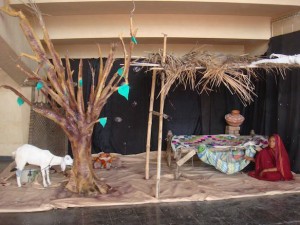Tehrik-e-Niswan Highlights Fistulae and Related Prejudice
“I am convinced that it is not possible for Pakistan to develop unless women find an equal position in our society.”
– Sheema Kermani

Obstetric fistulae may be one of the biggest health issues in Pakistan that no one talks about.
Thankfully, there is a small group of people trying to change that. Their new film publicises the plight and bravery of women living with this misunderstood condition.
People from across socio-economic boundaries flocked to the July 30 premiere of Tehrik-e-Niswan’s telefilm Mae Jioungi Sar Uttha Kay. The film relates the true stories of women living with obstetric fistulae, a horrible medical condition that carries with it extreme negative stigma in Pakistan. Directed by Anwer Jafri, produced by Sheema Kermani, shot by Jamil Akhter and guided by Dr Shehzad Syed, Mae Jioungi Sar Uttha Kay highlights the fact that fistulae are curable and that to shun a woman for having one is inhumane.
An obstetric fistula is an abnormal hole that can develop between the rectum or bladder and the vagina as a result of prolonged, obstructed labour. Women with the condition are unable to control the flow of their urine or faeces, or both. In Pakistan, such women are often labelled impure. Thus, they face consequences ranging from being made to sleep outside their homes to being abandoned by their families and husbands.
It has been 11 days since the premiere and this reporter has yet to find an article on the wonder that was this documentary. Considering the current priorities of many in the media, it was perhaps the lack of ‘celebrities’ or a ‘high-end’ crowd that caused the screening to be denied the recognition it deserved.
The programme started with a three-minute slideshow on what obstetric fistulae are and how women in Pakistan are vulnerable to developing them. The risk is significant due to the low levels of obstetric care in rural areas, while the stigma they face once they have the condition can be crippling. The audience received information regarding women who have suffered fistulae and even those who have survived, while the slideshow also shed light on the campaign that is currently being lead by UNFPA to fight the fistulae in Pakistan and other countries.
After the slideshow (and some frustrating technical difficulties) the film was screened. From child marriage and domestic abuse to the lack of basic healthcare, various aspects relating to the ill treatment of women with fistulae were painstakingly illustrated. The film was also successful in highlighting the sorry state of women’s rights, poverty alleviation and socio-cultural openness in Pakistan.
This reporter sat down to talk with Tehrik-e-Niswan founder Sheema Kermani about her views on Mae Jioungi Sar Uttha Kay.
What inspired you to make this telefilm?
Tehrik-e-Niswan has been working on women’s rights issues for the last 30 years. Pakistan is a patriarchal society where women’s lives are not given importance — a woman is not an equal citizen and her place in society is at the lowest. We feel that unless women can live with respect and dignity, and are given equal status, no society can develop.
Thousands of women die because of fistulae every year in Pakistan. Thousands are forced into seclusion and a life of humiliation and misery simply because they are suffering from fistula. Tehrik’s work on women’s health issues brought this problem to our attention. Dr Shershah, who has been a pioneer in helping these women recover and lead a normal life, asked us to make a stage play, which was then performed on many occasions in hospitals, clinics, medical colleges and community centres. Later that was made into this film.
Where do you plan on airing this film?
We hope to have it shown on different TV channels. Also, the film will be distributed to organisations working on rights issues.
Amongst all the issues that exist in our country, why is it that the issue of women’s rights is your biggest concern?
I think women’s rights are one of the most crucial issues in this country. No society or people can move forward until the women of that society have an equal status.
In Pakistan, women are more than 50% of the population but they are not able to live their lives to their full potential. I am convinced that it is not possible for Pakistan to develop unless women find an equal position in our society.



